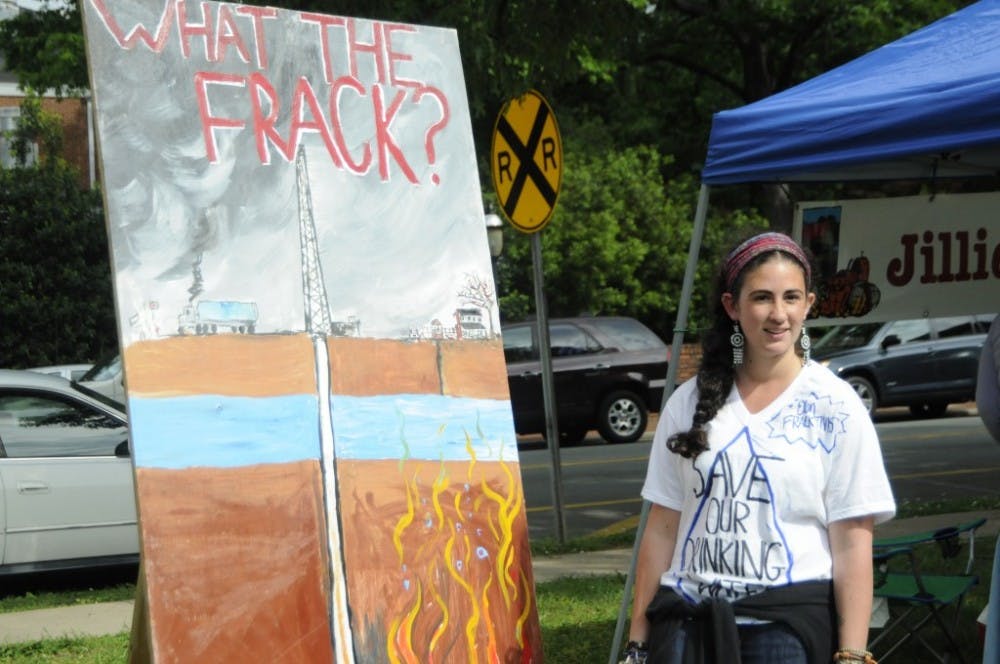Elon Community Church’s farmers market has been growing as slowly and steadily as the vegetables it has been selling for the past five years. Kicking off this year on April 19, Earth Day, the small, empty patch of grass at the ECC quickly came to life with the hustle and bustle of Elon University students, faculty and staff and local community members sampling jams and cheeses, examining hand-made pottery and birdhouses and learning a little bit more about where their food comes from.
Since its small start in 2008, the farmers market has grown substantially. Even the length of its season has been extended to accommodate the countless members of the university community who only got to experience the market for a few weeks at the beginning and end of each school year, according to Sandra Sarlinga, an ECC member who created the market with her husband and has been coordinating it ever since.
Sarlinga and her husband, Fabian Lujan, are vendors at the market as well. Lujan bakes artisan breads and pastries, and he and Sarlinga also sell farm-fresh eggs.
ECC’s list of vendors continues to get longer, but since the church is environmentally and community-minded, there are a few rules in place to keep it a local operation. Redbud Farm, the only certified organic vendor, is the closest at about 12 miles away, but even those with the longest distance to go are within a 30-mile drive.
“We love the farmers market,” Sarlinga said. “With the farmers market, we intend to be as local as possible. All the farmers grow what they bring, and most of them, if they’re not certified organic, they do go as natural as they can. We are small, but it’s a nice town feeling and we like it.”
Nancy Joyner, who owns Redbud Farm with her husband Clay Smith, sells her produce at other venues as well, and said interacting with her customers at weekly markets is the best part of farming.
“My favorite part is probably just sharing with people about food,” she said. “It so unites us all. Teaching people what they can do with Swiss chard or growing their own plants, or what a person can cook if they’re in a dorm room or just have a microwave, or just a way to get connected again and know where your food is coming from, is the fun part of the market.”
Senior Amber Mathis volunteered at Redbud Farm on behalf of Campus Kitchen last year, and said she has always enjoyed going to the farmers market for its community feel. Bigger farmers markets often feel like big businesses, she said, and she likes knowing about the roots of her food.
“I think that’s what people like about farmers markets,” she said. “They get to know where their food comes from, and you can really do that in a small market like this.”
The goal is to keep the market food-oriented, but Sarlinga said she values the diversity that other types of vendors can bring to it as well. This year, Elon senior J.R. Riegel brought a slew of colorful pottery to sell at a stand he calls “Jars Pots.”
Riegel is an art major concentrating in ceramics, and while some of the pieces were made for class, he said he was most proud of a collection of cups he made from start to finish — including digging up the clay from his own backyard near the Blue Ridge Mountains in Virginia.
“I think it’s a good venue to sell at,” Riegal said. “I thought of doing a sale based in Arts West, in the studio, or in Moseley, and I just feel like this is a great place for people to sell hand-made things.”
Riegel said Jars Pots was far more successful than he had hoped, and people were going up to his table to buy things even before the market officially opened at 3:30 that afternoon.
Even though most anything from plants to meat and honey to birdhouses can be found at the ECC Farmer's Market, Sarlinga said the most important rule is that vendors are not allowed to resell anything. It helps keep the focus on eating local, a trend Sarlinga said she thinks is really important, especially since her own family makes its living from selling at farmers markets.
“Over here, you are creating a relationship,” she said.


